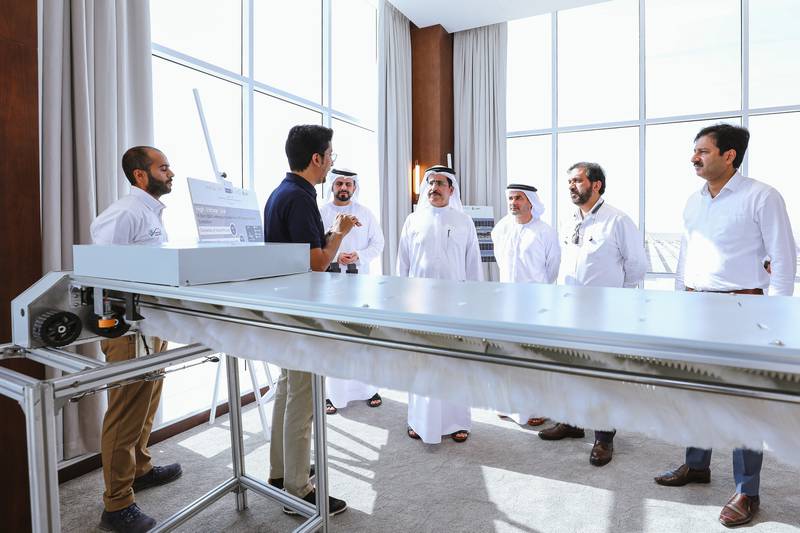Work at Mohammed bin Rashid Al Maktoum Solar Park ‘progressing well'

Dubai Electricity and Water Authority chief executive Saeed Al Tayer inspected progress at the fourth and fifth phases of the Mohammed bin Rashid Al Maktoum Solar Park, the largest single-site solar park in the world, which is expected to have a total capacity of 5,000 megawatts by 2030.
The utility is working on the fifth phase of the project in partnership with a consortium led by Saudi Arabia’s Acwa Power and Gulf Investment Corporation, using the independent power producer (IPP) model.
In 2019, Dewa achieved a world record by receiving the lowest bid of $1.6953 cents per kilowatt hour for the fifth phase. Work on the fifth phase, which has a total investment of about Dh2.06 billion ($561 million), “is progressing as planned”, Dewa said.
The second project is 93.3 per cent complete while the third is 23.06 per cent complete. The first project, which began to operate last year, “has been recording higher-than-expected performance”, with production capacity rising to 330MW, from 300MW.
The site uses “the latest solar photovoltaic bifacial technologies, which allows solar radiation to reach the front and back of the panels, with single-axis tracking to increase generation”, Dewa said.
The utility plans to use fully automated robots to clean the solar panels, increasing their efficiency. The fifth phase of the project will provide clean energy to more than 270,000 residences in Dubai and will result in a reduction of 1.18 million tonnes of carbon emissions annually. It will be commissioned in stages until 2023.
Work is also progressing at the fourth phase of the solar park, with investments of up to Dh15.78bn. The overall construction of the project, with a total capacity of 950MW, is 90 per cent complete, Dewa said.
A consortium led by Dewa and Acwa Power formed a project company, Noor Energy 1, to design, build and operate the fourth phase.
Dewa owns 51 per cent of the company while Acwa Power holds 25 per cent and the Chinese Silk Road Fund owns a 24 per cent stake.
The fourth phase will provide clean energy for about 320,000 residences and lead to a reduction of 1.6 million tonnes of carbon emissions every year.
Dubai aims to meet all of its power needs using clean energy sources by 2050. Renewables' share in the emirate's energy mix has hit 11.5 per cent and is expected to reach 14 per cent by the end of 2022.
Dewa’s installed capacity currently stands at 14,117MW of electricity, the utility said. The UAE plans to invest Dh600bn in clean energy projects as part of its Net Zero 2050 strategy. It is also building world’s largest solar plant in Abu Dhabi's Al Dhafra region, with a total capacity of two gigawatts.
The utility is working on the fifth phase of the project in partnership with a consortium led by Saudi Arabia’s Acwa Power and Gulf Investment Corporation, using the independent power producer (IPP) model.
In 2019, Dewa achieved a world record by receiving the lowest bid of $1.6953 cents per kilowatt hour for the fifth phase. Work on the fifth phase, which has a total investment of about Dh2.06 billion ($561 million), “is progressing as planned”, Dewa said.
The second project is 93.3 per cent complete while the third is 23.06 per cent complete. The first project, which began to operate last year, “has been recording higher-than-expected performance”, with production capacity rising to 330MW, from 300MW.
The site uses “the latest solar photovoltaic bifacial technologies, which allows solar radiation to reach the front and back of the panels, with single-axis tracking to increase generation”, Dewa said.
The utility plans to use fully automated robots to clean the solar panels, increasing their efficiency. The fifth phase of the project will provide clean energy to more than 270,000 residences in Dubai and will result in a reduction of 1.18 million tonnes of carbon emissions annually. It will be commissioned in stages until 2023.
Work is also progressing at the fourth phase of the solar park, with investments of up to Dh15.78bn. The overall construction of the project, with a total capacity of 950MW, is 90 per cent complete, Dewa said.
A consortium led by Dewa and Acwa Power formed a project company, Noor Energy 1, to design, build and operate the fourth phase.
Dewa owns 51 per cent of the company while Acwa Power holds 25 per cent and the Chinese Silk Road Fund owns a 24 per cent stake.
The fourth phase will provide clean energy for about 320,000 residences and lead to a reduction of 1.6 million tonnes of carbon emissions every year.
Dubai aims to meet all of its power needs using clean energy sources by 2050. Renewables' share in the emirate's energy mix has hit 11.5 per cent and is expected to reach 14 per cent by the end of 2022.
Dewa’s installed capacity currently stands at 14,117MW of electricity, the utility said. The UAE plans to invest Dh600bn in clean energy projects as part of its Net Zero 2050 strategy. It is also building world’s largest solar plant in Abu Dhabi's Al Dhafra region, with a total capacity of two gigawatts.
Source: www.thenationalnews.com
